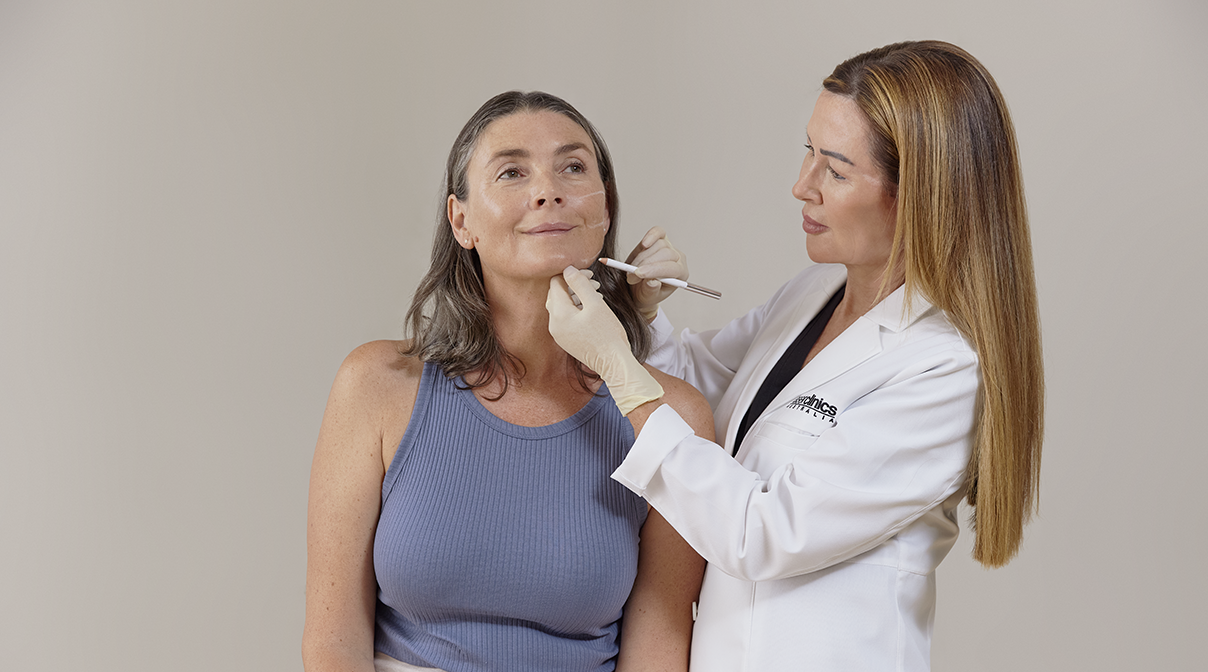You may not see it happening, but the decline is gradual, and once it starts, it doesn’t stop on its own. Collagen, the structural protein that keeps your skin firm and plump, begins to diminish in quality and quantity as early as your mid-20s.
By the time you notice fine lines deepening into folds, or your once-smooth cheeks losing their bounce, your collagen network has likely thinned out significantly.
In this article, we’ll break down how to support and stimulate collagen regeneration through science-supported methods, foods and vitamins, and professional treatments.
What are the Signs of Low Collagen Levels and Are They Irreversible?
Here are some of the most common signs that your collagen levels may be declining:
- Fine lines and wrinles that gradually deepen over time
- Loss of skin elasticity, especially around the jawline, cheeks, and under the eyes
- Thinner or more fragile skin that bruises or irritates easily
- Dryness and rough texture, as collagen plays a key role in moisture retention
- Delayed wound healing or increased skin sensitivity
- Sagging or hollowed appearance, particularly in the mid-face
- Joint stiffness or discomfort, especially after activity or with age
- Weakened nails and thinning hair, since collagen supports structural proteins throughout the body
- Reduced muscle tone and slower post-exercise recovery
So, are these changes irreversible? Not completely — and that's the good news. While collagen production does decline naturally with age (and damage from UV or lifestyle factors can’t be undone entirely), several strategies can help stimulate collagen renewal and improve visible signs of depletion.
Foods Rich in Collagen
What you eat plays a major role in how well your body produces and protects collagen. While supplements can help, everyday foods can offer a natural boost too, if you know what to look for:
- Fatty fish (e.g., salmon, mackerel, sardines): These are rich in omega-3 fatty acids, which support collagen production by reducing inflammation and improving skin barrier function.
- Flaxseeds and chia seeds: Excellent plant-based sources of alpha-linolenic acid (ALA), an essential omega-3 that helps maintain hydration and contributes to the structure of the skin.
- Eggs (especially membrane): Eggshell membranes are a direct source of type I collagen and can reduce collagen degradation.
- Seaweed and algae: A plant-based source of DHA (docosahexaenoic acid), especially valuable for those on vegan or vegetarian diets looking to support skin health and collagen.
Adding even a few of these to your daily meals can help lay the groundwork for better skin structure, joint health, and overall resilience, especially when paired with other collagen-supporting habits.
Vitamins for Collagen Production
Here are some of the key vitamins that play a role in collagen production and stability:
- Vitamin C: This is one of the most important nutrients for collagen synthesis. It’s a cofactor for enzymes, which helps the collagen fibres form properly to ensure they’re strong and resilient. Vitamin C also protects collagen from oxidative stress and cellular damage caused by free radicals from pollution, UV exposure, and other sources.
- Vitamin A: Vitamin A stimulates the skin’s fibroblasts, which are responsible for making collagen. It also reduces enzyme activity which could break down collagen. Studies have shown that even short-term use of topical vitamin A in older adults can help boost collagen production and reduce visible signs of ageing in sun-protected skin.
- Vitamin E: Vitamin E might not increase how much collagen your body makes, but it could play a key role in how strong and stable that collagen is. A study on vitamin E deficiency in rats found that their skin produced more fragile, less stable collagen. While this research isn’t based on human data, it highlights the potential role of vitamin E in supporting the structural integrity of collagen, not just its production.
- Vitamin D: While it’s best known for supporting bone health, Vitamin D may also play a role in collagen production. Research shows that its active form can influence how much collagen the body produces by helping increase enzymes that break down old or damaged collagen.
Professional Skin Treatments for Collagen Stimulation
Professional treatments offer targeted ways to stimulate collagen deep within the skin, improve texture, and address early signs of ageing at their root. Here’s how each one works:
- Skin Needling / Microneedling: This treatment uses fine needles that create tiny injuries in the skin to trigger the body’s natural wound-healing response. In doing so, fibroblasts are activated to produce more collagen resulting in firmer, smoother skin over time.
- LED Light Therapy: Near-infrared light wavelengths used in LED Light Therapy can penetrate the skin and stimulate fibroblast activity. This helps encourage collagen production at a cellular level without discomfort or downtime. Over time, LED light therapy can help improve skin density, reduce inflammation, and provide a more youthful complexion.
Final Thoughts
Supporting your skin’s collagen network is also the pursuit of sustaining your skin’s overall health, not just youth. From nutrient-rich foods and targeted vitamins to science-backed in-clinic treatments, there are more options to help your skin bounce back.
At Laser Clinics Australia, we understand that no two skin journeys are the same. Whether you're just starting to notice early signs of collagen loss or you're ready to take a proactive step with advanced aesthetic treatments, our team of experts can guide you toward a personalised plan that fits your skin's needs and your lifestyle.
Ready to turn back the clock on ageing? Book a complimentary consultation and explore Tailored Treatment Plans to keep your skin looking youthful.











